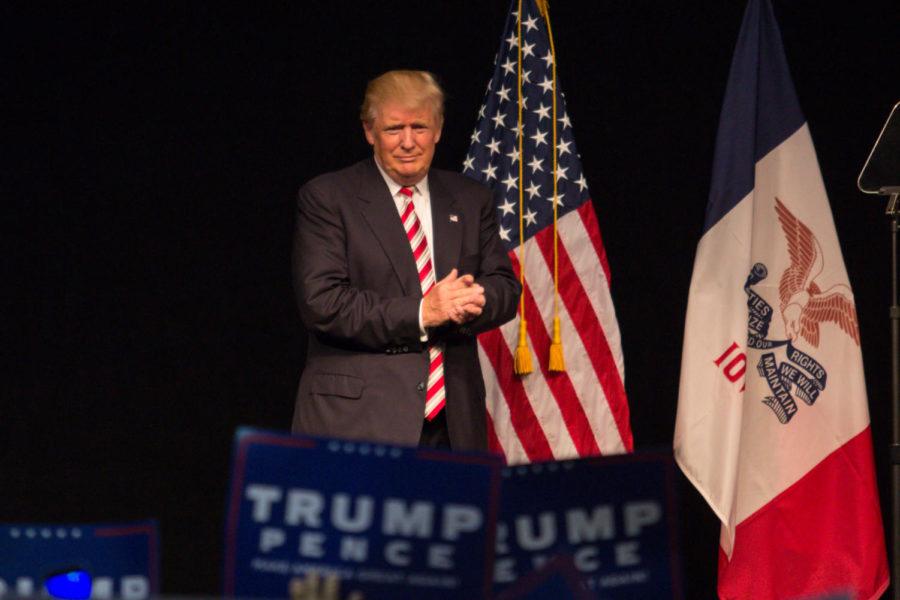Kelly: Is our media hypocritical?
Republican presidential nominee Donald Trump acknowledges the crowd gathered as he leaves the stage on Sep. 13 in Clive, Iowa.
March 8, 2017
Much has been made of President Trump’s relationship with the media. Undoubtedly, he has been hostile toward numerous news outlets. But, as is often the case in politics, the truth of the matter — whether Trump is actually a veritable Joseph Stalin, or whether “everything” is “fake news” — lay somewhere between the media’s antagonistic, reactionary attitude toward Trump and Trump’s immediate dismissal of all news that casts him or his administration in a negative light.
It’s foolish to assert that inaccurate reporting of several stories indicates that an entire news publication is illegitimate. But the media’s incessant rush to generate headlines and publish stories that paint the Trump administration as inept or malicious is not the proper response to Trump’s verbal rebukes.
Recently, news outlets and individual reporters have stressed the necessity of unabashed journalism that seeks to uphold the truth, regardless of pushback. This is a worthwhile and necessary goal. But the same media, which now sees itself as the lone bastion against misinformation — willing to bare itself to reprimand of any kind, and which seeks daily, even hourly, to hold the president and his advisers accountable – viewed its role much differently the past eight years.
From at least 2010 to the conclusion of the 2012 election, the IRS, according to the then-inspector general, was “using inappropriate criteria to identify organizations applying for tax-exempt status,” targeting conservative-leaning groups for invasive investigation regardless of whether the groups were complying with pertinent regulations.
The IRS also illegally leaked information about the donors of the National Organization for Marriage (NOM) to the Human Rights Organization, which released the information to the public. The IRS has since settled with NOM, agreeing to pay them $50,000. Prominent media outlets had little to say about both stories at the time of their occurrences, respectively, and many members of the media still assert that the Obama administration was unencumbered by scandal.
This was not an isolated occurrence of questionably disinterested reporting during the Obama administration. Last May, former Deputy National Security Adviser Ben Rhodes admitted to a New York Times reporter that the Obama administration had knowingly sold the Iran deal to the American public under false pretenses, claiming that a major factor in the United States’ decision to make concessions was the recent election of a president the White House had branded as moderate.
It was later confirmed that the White House already had discussions with Iranian officials and made concessions before the 2013 Iranian presidential election, and that Supreme Leader Ali Khamenei had handpicked a slate of presidential candidates, including Hassan Rouhani — the supposed moderate. In the interview, Rhodes said that he had made use of “legions of arms control experts [who] began popping up at think tanks and on social media” and became “sources for hundreds of clueless reporters.”
Earlier this year, inconsolably despondent Buzzfeed employees — including beat reporters, news editors and even higher-up editors — tweeted during former President Obama’s farewell address that they simply could not hold back tears while watching the speech.
A few days later, The New Yorker ran a piece warning that Trump’s actions should be taken no less lightly than those of Hitler in 1934, a narrative not uncommon among major publications throughout the course of Trump’s presidential campaign. New York Times columnist Paul Krugman wrote several articles, beginning in November 2016, making the case for deficit spending. Yet just eight weeks later, shortly after Trump’s inauguration, Krugman authored a piece titled “Deficits Matter Again.”
The details surrounding these instances vary. But one theme holds true among them: when members of the media are fond of a politician, positive stories must be heralded, and negative stories must be spun or even buried.
A media that weeps when a president leaves office is not likely to prioritize truth when reporting on the actions of that president’s administration, or to take information given directly by the White House with a grain of salt. A media that considers certain political figures as comparable to history’s most nefarious rulers, while failing to draw legitimate parallels, is unlikely to obtain broad-ranging support from citizens who happen to support those figures. A media that reverses its belief in economic theories based on the politics of the current president does not have a leg to stand on when it comes to principled, objective reporting or commentary.
Herein lies the problem for today’s media. Trump’s fledgling presidency has been wildly disorganized and laden with internal conflict. Members of the new administration, including Trump, have a dubious history of contact with Russian officials. This undoubtedly warrants scrupulous investigation by the media and should be cause for a congressional investigation.
Verifiable reporting and journalism backed by concrete evidence is still essential. But the media’s recent willingness to print stories lacking due verification contradicts its own narrative that it possesses a duty to hold those in public office accountable — by way of making the truth known to the public — regardless of their political affiliation.
If the media truly wishes to destroy Trump, the best course of action would simply be to verify, and subsequently highlight the foibles of his administration, connecting with readers by plainly stating fact and straying from exaggeration. Self-aggrandizement and hyperbole will only drive distrust of the media upward. However, as of right now, there is minimal evidence to suggest the media will abandon its current course of action.







